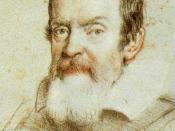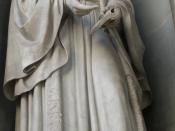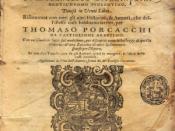If the Renaissance was the archway to the Reformation, education was its keystone. For the first time in European history, a majority of the sons of noble birth considered universities before they went out into the world. There began to be an unwritten standard in society that members of the upper class should be educated. Naturally there began to become drastic differences in opinion over what subjects should be taught, who should be educated, and what kinds of outcomes should be expected from the education.
One of the reasons why the Renaissance was thought to be so revolutionary was because for the first time in Christendom, secular thought was introduced and widely accepted. Though the Renaissance was by no means a strictly secular movement, it sparked and propagated a Humanistic philosophy. For the first time the Christian man was allowed to look outside (though not deny) the "box" of God's omnipotent power over him and trust that he had the capacity to make his own fortunes.
Though the conventional Renaissance college education was generally based on the humanities, people disagreed about which subjects would produce the ideal man. Therefore the first question about Renaissance education was "What is going to be taught?" Document 1 makes an excellent point in emphasizing how important the transition was from simple study of language structure in grammar school to study of analyzing letters (humanities). As the author pointed out, woe is to the prince who does learn his lessons from history. Innocent III is a prime example of such a "prince" for though he was smart and politically savvy as all popes were, he issued a papal bull for the Fifth Crusade, ignoring the utter failures of the ones previous. Guarino, the author of Document 2, called for the study of the humanities for it brought men "virtue." He seemed to be right for after following his own advice Guarino would become one of the defining and renowned poets of the Renaissance. A slightly different opinion comes from Erasmus, the writer of Document 4. He states that humanistic thought is vital for a student, and the best route to this thought is through the study of Classical literature, not history. It is curious that one of the great Classical philosophers who he focuses on, Socrates, defined virtue as a body of "precisely attainable knowledge," a philosophy on learning that fits in more with that of the authors of the previous two documents than with Erasmus. Document 13 goes more into agreement with Document 1 than does anything else; it states that the greatest difference between grammar school and university is that in universities they teach you the "real world" stuff instead of just grammar, rhetoric, etc. He seems to be emphasizing the value of "hands-on" rather than just theoretical language. What is most interesting about all these arguments is that though the suggestions for subject-matter may have been different, the overall theme was still recurring. Humanity may have been instructed to follow humanistic thought and to rediscover their seemingly limitless mortal strengths, but everything would still eventually encircle God, the true final judge of morals and character.
The next question was "Who will be taught?" It certainly couldn't have been everyone. The Renaissance's new education system was a hypocritical renewal; it boasted about rebirth and man's natural rights and powers, but it ousted the average man in most of its greatest feats. Nothing had been done to improve the condition of women or minorities. Only high society would receive the wonderful humanistic instruction that the Renaissance is so well known for. The first Document we will examine, #5, describes the author opinions about the education of women. It is his belief that women should be taught in order to improve their femininity - every subject should better some sort of womanly skill that will prepare them for, and assist with, marriage. These views fall in line with those of Comenius, who is often called the father of modern education. He too fought for female schooling for these very reasons. The second Document, #11, claims that schooling is made for the elite, and should therefore be very limiting in its admission. The arguments used say that everyone should fill only their own role in society; intellectuals should think and confer, farmers should cultivate the land, and merchants should trade. The author claims that a disruption could be caused in their stability if the laypeople were exposed to the advanced humanistic education for they were all needed in their current posts, and allowing them to leave these posts to seek education would cause volatility and unrest. These attacks on laymen education are very similar to the attacks made on female education: "These people should know their place, and teaching them something that might make them want to change their circumstances is wrong."The third question asked was "What is going to come out from all this?" What kind of person should result from all these expensive efforts? This is perhaps the most important question, for the answer to it decided whether or not this education was worth its price. Some, such as the author of Document 3, stood at a conservative viewpoint when answering this question. "The education should give us men of good chivalry and civility, a true servant of God" they might say. Castiglione, the author of Document 3, described the proper educated courtier as one who is well-versed in history and in writing, one who has the skill to critique works of others but would never "want for pleasant entertainment with the ladies." In short Castiglione seemed to have wanted the ideal Renaissance gentleman to be very well educated, partially so he could be "smart enough" to resist temptation and pleasure. This writing came in stark contrast with fellow Renaissance writer Lorenzo Valla's On Pleasure, which proclaimed that the gentleman should not resist his God-given temptations for satisfaction. This battle of traditionalists vs. revolutionaries helped shape different, sometimes contradicting ideals for what the the outcome from education should be. Document 12 shows how in a century, the percentage of justices of the peace in various European states who were university-educated grew from an insignificant percentage in the single digits to a comfortable majority, all in a single century. This reveals to us a huge paradigm shift in the beliefs about the importance of education - it seems as though elites were coerced into attaining university education. It would be this immense elevation in the intellectual quality of the power elite that would allow for the development of the Scientific Revolution and the Enlightenment. One more broad-minded view of what an education should accomplish came from Francesco Guicciardini, author of the quote in Document 6. He described the ideal gentleman as one who today we would refer to as a true "Renaissance Man." He writes that in his career, he has seen the emerging importance of skills in a gentleman that he grossly underestimated as a youth. In his mind, the true Renaissance Man has a reservoir of abilities that may not immediately seem useful, but might later come out in fine company in order to promote his social standing. This was what Renaissance education was all about: humanities education whose value would mostly likely be truly appreciated at a later point in life. This was perhaps one of the everlasting aspects of the Renaissance, for the same ideology is around today in our liberal arts colleges, which typically include those universities that we consider to be the best in the world.
In this age of human self-discovery and intellect, the opinions about educational curriculum, recipients of the schooling, and the type of man that ought to result from such an education altered drastically. Despite these differences, an emergence of a humanistic syllabus seemed to be favored by everyone. To a certain extent, everyone seemed to agree that the ideal gentleman is schooled on they varying aspects of human culture.
Bibliography:A History of Western Society, seventh edition





